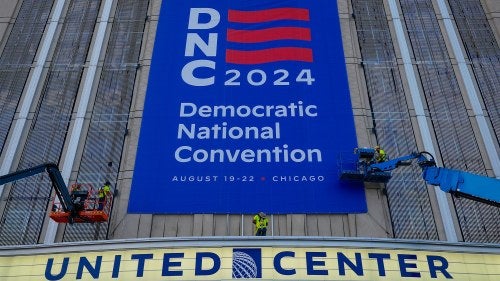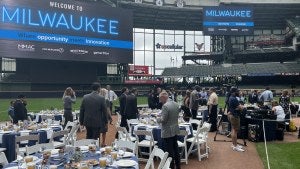Chicago's Foreign Consulates Prepare For the DNC

It's not only Americans who go to the RNC and DNC. Here, two consulates tell us what motivates them to attend these surprisingly global events.
Chicago will host the Democratic National Convention this week and draw thousands of attendees and days of national, round-the-clock media attention. But if past conventions are any precedent (and in an unprecedented year — maybe they aren’t), the DNC will quickly fade from most Americans' memory. Conventions usually give a party only a small boost in the polls, and that often fades quickly, according to an analysis from ABC’s FiveThirtyEight.
Still, American voters aren’t the only ones tuning into the DNC and RNC. Other countries closely monitor the U.S.’s political conventions, and they often send their ambassadors and diplomatic staff to the events in person. Chicago is home to about 70 consulates focused on the Midwest, and the DNC and RNC’s proximity presents a unique opportunity for Chicago’s foreign diplomats — though making the most of it can be a delicate balancing act.
Consular staff, both in Chicago and elsewhere, are tasked with advocating for their country’s image and interests, as well as interpreting local and regional politics for their home country’s capital. The convention is a rare chance for Chicago’s diplomats to do both, but participating can also be a risk if their advocacy starts to look like political interference or favoritism for a specific candidate — either of which could endanger bipartisan support, risk their reputation with the American public, and harm their bilateral relationship with the U.S.
Despite the risks, many consulates will send representatives to the convention this week, and experts and diplomats tell ChicagoGlobal that three goals will likely shape their participation: observing, networking, and promoting.
Observing and Information Gathering
At a political convention, foreign diplomats are likely focused on two things, explained Paul Poast, a professor of international relations at the University of Chicago.
“There is, one, just information gathering,” he said.
This might include answers to questions like “‘What conversations are happening? What are the topics being brought up?’” he explained, and then “probably taking information, writing a report, sending that report back to the embassy” and, ultimately, to the home government.
In separate interviews with ChicagoGlobal, both the Japanese and Australian consulates said this was their top priority. Both Consul Generals attended the RNC and plan to attend the DNC, alongside other consular and embassy staff.
“Japan does not have any intention to make comment or intervene into the U.S. political process,” said Jun Yanagi, Consul General of Japan in Chicago. “As a close ally and global partner, [the] Japan-U.S. relationship is a cornerstone or backbone of Japanese foreign and security policy. That’s why we are very much interested in observing what is going on.”
Australian Consul General Chris Elstoft described his role at the convention similarly. “You can sum it up as: to connect, to understand, and to advocate.”
“Conventions are a very domestic affair,” he added. “The advocacy piece for us is not the emphasis, really — it’s more about connecting and understanding. You can somewhat understand a convention by watching it on television, but you get a much greater understanding by being there on the spot and getting the feel of it.”
At the RNC, Yanagi appreciated the chance to observe the atmosphere firsthand.
“On site, we can look at…how people are excited or not excited, how it’s full or not full,” he said. In addition to hearing what the candidates have to say, he watched for “how their message, their speech, were received by the delegates and the audience.”
"This is just my personal observation: I think I am witnessing one of the [sources] of greatness of the United States of America — the kind of textbook style of grassroots democracy."
Networking: Who's Who?
The U.S. State Department collaborates with the RNC and DNC to set up a schedule of panels and networking events during the conventions for high-level diplomats — including Elstoft’s boss, Australia’s Ambassador to the U.S., Kevin Rudd.
“I'm sure that the parties and others at the convention are grateful that that is organized and streamlined,” Elstoft said, “because the absence would be a bit chaotic with 100-and-something ambassadors all running around trying to get access to various meetings.”
Elstoft just arrived in the U.S. in December, and for him the convention is a chance to meet with Midwesterners converging on Chicago and Milwaukee from the 12 states that Australia’s Chicago consulate covers. There are scheduled convention events and speeches to attend, of course, but off-stage there are also after-parties, hallway run-ins, and corridor conversations.
“I can connect with people and hear their views in a very intense way that would take me weeks if I got out on the road,” he said. “You can just sit down at a table, having a brat and a beer, and talk to delegates who’ve come in from North Dakota — and I’m not going to easily get to meet those people on any given day.”
Local business groups also organize their own networking events around the edges of the official convention programming. During the RNC, Elstoft went to the Brewers stadium for a business breakfast with the Metropolitan Milwaukee Association of Commerce.

Elstoft at brunch hosted by the Metro Milwaukee Association of Commerce (MMAC) at American Family Field, Milwaukee (Photo: Chris Elstoft)
“It’s about deepening your understanding and perhaps overcoming some shallow impression that you might have a state,” Elstoft said. “Yes, Wisconsin is big into dairy and cheese, but there’s also some really interesting things going on in southeastern Wisconsin with regard to manufacturing and machinery. And then you meet actual companies who are exporting to Australia.”
“It’s not altogether different from normal diplomacy,” he said. “It’s more like the intensity of it.”
Balancing Advocacy and Neutrality
While part of a diplomat’s role is to promote their country and its interests abroad, managing that responsibility at a national political convention can be tricky.
“Foreign governments lobby other governments,” said Poast. “The reality is, that day-to-day kind of lobbying happens, especially in D.C. These embassies, part of their job is to go and meet with representatives, meet with senators, meet with their staff, [and] make their case for all sorts of things,” he said.
“I can’t speak to the inside conversations and the intricacies of a consulate,” he cautioned. Still, Poast expects that part of a diplomat's role at a convention is relationship-building and “setting groundwork for the bigger lobbying that will happen in D.C.”
Too much lobbying and advocacy, though, can be risky, Poast says.
“You don’t want to be seen as somehow interfering with the election process,” he explained.
"We don’t speculate on the outcome or express a preference on that outcome. We work with the administration and the Congress of the day."
“At the same time,” he added, “while we’re not involved in politics, we will always take the opportunity to advocate for Australia’s position. So, that’s not to say that we’re not engaging and advocating for the things that Australia believes in — whether it’s values or economic policies or principles.
“But we do that in a very evenhanded way that ensures we’re not seeking to be a player — more a partner — and engaging in a two-way dialogue with the U.S. about the bilateral relationship.”
“Just observing is not that tricky,” said Yanagi, the Japanese consul. “My job is to ensure good Japan-U.S. relations — mutual trust and deep friendship at the state and local level. Whatever happens in Washington, we want to ensure this kind of [relationship].”
Midwest on the Map
The DNC and RNC’s Midwest settings are a potent opportunity for Chicago-based consulates to highlight their countries’ cultural, social, and economic ties to voters, convention attendees, and even international audiences.
When the world is watching, Elstoft said, “you can explain why the Midwest matters, why Wisconsin matters, why Chicago matters, Illinois matters. And those are for obvious reasons politically, but also that’s a platform to tell a wider story about our [Australian] business interests here.”
That’s especially important in the U.S., Poast notes. Compared to smaller nations and those with more centralized governments, in the United States consulates have an outsize importance since they provide on-the-ground links to state and local governments that are powerful but far away from the embassy in D.C.
While embassies are often focused on national politics, “consulates play a key role — and sometimes maybe even play the key role — in negotiating and representing the country at the level of state governments [and] local governments,” said Poast.
That might add some stress to consulates, especially when both national political conventions are in their backyard, but Elstoft appreciated the opportunity to attend the RNC and is looking forward to the DNC.
“Obviously there’s a lot at stake and politics is occurring,” said Elstoft, “but at a personal level, [the RNC] was a very warm and engaging experience. I found that I learned a lot.”
“I think the same will be the case here [in Chicago],” he added.
This story first appeared in the ChicagoGlobal newsletter, a joint project of Crain's Chicago Business and the Chicago Council on Global Affairs.

